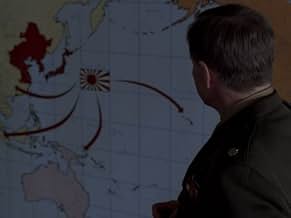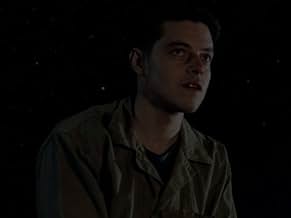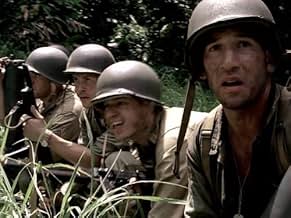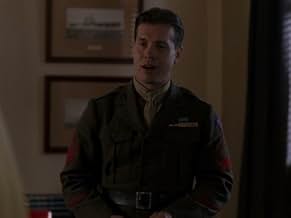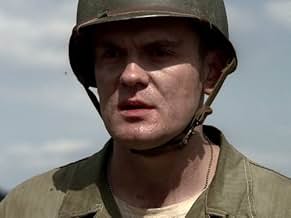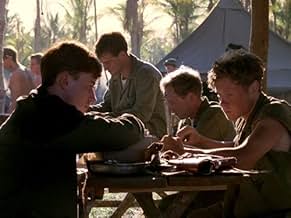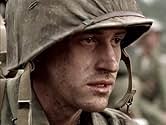द्वितीय विश्व युद्ध का प्रशांत रंगमंच, जैसा कि कई युवा नौसैनिकों की आंखों से देखा जाता है.द्वितीय विश्व युद्ध का प्रशांत रंगमंच, जैसा कि कई युवा नौसैनिकों की आंखों से देखा जाता है.द्वितीय विश्व युद्ध का प्रशांत रंगमंच, जैसा कि कई युवा नौसैनिकों की आंखों से देखा जाता है.
- 8 प्राइमटाइम एमी जीते
- 36 जीत और कुल 44 नामांकन
एपिसोड ब्राउज़ करें
फ़ीचर्ड समीक्षाएं
I'm guessing most of us watched 'The Pacific' for at least one of the following 3 reasons:
1. We have an interest in history, particularly in WW2.
2. We are fans of movies and television shows (well, the good ones anyway)
3. We had seen - and loved - the previous Hanks/Spielberg co-production 'Band Of Brothers' and expected a mini-series on the same level.
Now from reading some of the reviews here I gather that third reason was the most important one for many viewers - and it's also why 'The Pacific' apparently left quite a few people disappointed. As for me, I wasn't disappointed - I was devastated.
I'm a lucky man; I've never had to suffer through a war. But I had relatives who did, and though they're all long gone now, I'll never forget their stories. War is the most extreme and outrageous experience humans can possibly endure, but there are many different aspects and layers to it, because a war is not a single experience: it's all the experiences of all the individuals who have to suffer through it, and no single film or TV show can cover all of them. 'Band Of Brothers' focused on certain aspects of a war, and it chose a narrative that helped emphasize what the core theme of the series was: the brotherhood of war. It was about people who retain their humanity and form the closest of bonds under the worst, most horrific circumstances.
That inherently human element in 'BoB' was also why we could identify so well with the protagonists, and why we were - and still are - so deeply touched by what they had to go through. It's an outstandingly well made series, and I can't imagine how those experiences by those soldiers could have been portrayed better. Which is why 'The Pacific' doesn't even try. Instead, it goes almost in the opposite direction by choosing to focus on the sheer insanity of war: the relentless horror and despair of people losing their humanity and their struggle to regain it. Of course, just like 'BoB' it's also about the heroic sacrifices of those brave soldiers, but if there is a core theme in 'The Pacific' it's that of trauma: the trauma of having your humanity stripped from you and your personality shattered; the trauma of witnessing the complete disintegration of everything you thought you were and knowing you'll never be whole again.
What we see in 'The Pacific' is Hell, plain and simple. It's scores and scores of anonymous, young Japanese soldiers running senselessly into machine gun fire, wave after wave, until the piles of their bodies are so high they block the sight for the machine gun; it's American soldiers barely older than kids in despair or completely numb from the sheer amount of random death around them; it's vibrant young men turning into barely alive husks whose only remaining focus is to survive - which means they have to kill other barely alive young men who will stop at nothing to kill them in turn; it's kids killing other kids like rats by any means at their disposal: guns, knives, flame-throwers or with their bare hands; it's people living among the rotting corpses of their dead comrades and enemies and completely losing any regard for human life. And the few moments where we witness how those kids get a brief taste of how precious and beautiful life could be make their fate all the more heartbreaking.
Over large stretches, 'The Pacific' is devastating and depressing to watch, and though I found it never less than compelling, it's actually easy to see why many viewers who had hoped for a similarly engaging experience as in 'BoB' were left disappointed. But this is a different story about different people who fought in a different theater of the war and who went through different experiences, and once you stop comparing it to the story of the men in Easy Company from 'BoB', you'll find that, while different, in terms of sheer quality 'The Pacific' is every bit as good and as much of an outstanding achievement as its more popular predecessor.
The realism, the performances, the music and the production values in the series are superb (this was a 200 million production after all), and the attention to historic detail is simply staggering. As for me, witnessing what these men went through left me devastated; yet I am grateful I've watched 'The Pacifc': because in its relentless depiction of the horrors of war it honors the sacrifice these brave young soldiers made in the hope future generations wouldn't have to do the same. I originally rated this series 9 stars out of 10, but upon a recent rewatch and with more knowledge of the war in the Pacific theater, it's clear that this is a 10/10. Outstanding.
Favorite films: IMDb.com/list/mkjOKvqlSBs/
Lesser-Known Masterpieces: imdb.com/list/ls070242495/
Favorite TV-Shows reviewed: imdb.com/list/ls075552387/
1. We have an interest in history, particularly in WW2.
2. We are fans of movies and television shows (well, the good ones anyway)
3. We had seen - and loved - the previous Hanks/Spielberg co-production 'Band Of Brothers' and expected a mini-series on the same level.
Now from reading some of the reviews here I gather that third reason was the most important one for many viewers - and it's also why 'The Pacific' apparently left quite a few people disappointed. As for me, I wasn't disappointed - I was devastated.
I'm a lucky man; I've never had to suffer through a war. But I had relatives who did, and though they're all long gone now, I'll never forget their stories. War is the most extreme and outrageous experience humans can possibly endure, but there are many different aspects and layers to it, because a war is not a single experience: it's all the experiences of all the individuals who have to suffer through it, and no single film or TV show can cover all of them. 'Band Of Brothers' focused on certain aspects of a war, and it chose a narrative that helped emphasize what the core theme of the series was: the brotherhood of war. It was about people who retain their humanity and form the closest of bonds under the worst, most horrific circumstances.
That inherently human element in 'BoB' was also why we could identify so well with the protagonists, and why we were - and still are - so deeply touched by what they had to go through. It's an outstandingly well made series, and I can't imagine how those experiences by those soldiers could have been portrayed better. Which is why 'The Pacific' doesn't even try. Instead, it goes almost in the opposite direction by choosing to focus on the sheer insanity of war: the relentless horror and despair of people losing their humanity and their struggle to regain it. Of course, just like 'BoB' it's also about the heroic sacrifices of those brave soldiers, but if there is a core theme in 'The Pacific' it's that of trauma: the trauma of having your humanity stripped from you and your personality shattered; the trauma of witnessing the complete disintegration of everything you thought you were and knowing you'll never be whole again.
What we see in 'The Pacific' is Hell, plain and simple. It's scores and scores of anonymous, young Japanese soldiers running senselessly into machine gun fire, wave after wave, until the piles of their bodies are so high they block the sight for the machine gun; it's American soldiers barely older than kids in despair or completely numb from the sheer amount of random death around them; it's vibrant young men turning into barely alive husks whose only remaining focus is to survive - which means they have to kill other barely alive young men who will stop at nothing to kill them in turn; it's kids killing other kids like rats by any means at their disposal: guns, knives, flame-throwers or with their bare hands; it's people living among the rotting corpses of their dead comrades and enemies and completely losing any regard for human life. And the few moments where we witness how those kids get a brief taste of how precious and beautiful life could be make their fate all the more heartbreaking.
Over large stretches, 'The Pacific' is devastating and depressing to watch, and though I found it never less than compelling, it's actually easy to see why many viewers who had hoped for a similarly engaging experience as in 'BoB' were left disappointed. But this is a different story about different people who fought in a different theater of the war and who went through different experiences, and once you stop comparing it to the story of the men in Easy Company from 'BoB', you'll find that, while different, in terms of sheer quality 'The Pacific' is every bit as good and as much of an outstanding achievement as its more popular predecessor.
The realism, the performances, the music and the production values in the series are superb (this was a 200 million production after all), and the attention to historic detail is simply staggering. As for me, witnessing what these men went through left me devastated; yet I am grateful I've watched 'The Pacifc': because in its relentless depiction of the horrors of war it honors the sacrifice these brave young soldiers made in the hope future generations wouldn't have to do the same. I originally rated this series 9 stars out of 10, but upon a recent rewatch and with more knowledge of the war in the Pacific theater, it's clear that this is a 10/10. Outstanding.
Favorite films: IMDb.com/list/mkjOKvqlSBs/
Lesser-Known Masterpieces: imdb.com/list/ls070242495/
Favorite TV-Shows reviewed: imdb.com/list/ls075552387/
The Pacific miniseries will leave many of you in a state of awe. What a cinematic achievement. The best of the best of what American entertainment has to offer. The scenes and emotions portrayed are so vivid and lifelike that you'll think you've been transported back in time to the pacific theater of war. History has told us how horrid the war against the Japanese was. A war of attrition. This series will take you there and slap you on the wrists and then the face and remind you of the truth. War is utter diabolical hell. And the guys that fought in the pacific during WW2 were tough as nails. Tougher. It's ugly and beautiful at the same time. Enjoy and take a history lesson. You'll thank your lucky stars you did.
If you want to see the Pacific version of HBO's critically acclaimed "Band of Brothers", change the channel
"The Pacific" differs from "Band of Brothers" whereas the "The Pacific" focuses on the war itself and "Band of Brothers" focused on the characters. Both miniseries are championed by Hollywood heavy-hitters Tom Hanks and Steven Spielberg who were contributing writers and producers of both miniseries.
Perhaps the greatest distinction between the two mini-series was intentional. It is clear that the soldiers in the Pacific theater fought a different kind of war than those fighting in Europe. "The Pacific" is a gritty if not gory depiction of a war against not just the Japanese, but also the elements. The cast is made-up of some brilliant actors we are sure to see again in future projects. What makes "The Pacific" so good is the intense realism which brings the viewer into the battle from the safety of your couch. If there is hell on earth, you will find it here.
The army they are fighting is alien; both mysterious and ferocious. They are looked at with both awe and disdain and the Americans want to kill them all. However, there is a palpable sense fear among the men that this enemy will never surrender and will fight beyond what they feel is humanly if not morally possible. When one character hears about the Kamikaze's flying their planes into ships, he asks aloud "how can any man do that?" "The Pacific" is fast-paced and each episode leaves the viewer wanting more.
What lacks in the series is the intimacy of knowing the characters. They are kept at a distance almost as if the character doesn't want to let you in. This may be the intent of the writers; just as the soldiers took little interest in knowing each other, maybe we are not meant to know the characters.
"The Pacific" differs from "Band of Brothers" whereas the "The Pacific" focuses on the war itself and "Band of Brothers" focused on the characters. Both miniseries are championed by Hollywood heavy-hitters Tom Hanks and Steven Spielberg who were contributing writers and producers of both miniseries.
Perhaps the greatest distinction between the two mini-series was intentional. It is clear that the soldiers in the Pacific theater fought a different kind of war than those fighting in Europe. "The Pacific" is a gritty if not gory depiction of a war against not just the Japanese, but also the elements. The cast is made-up of some brilliant actors we are sure to see again in future projects. What makes "The Pacific" so good is the intense realism which brings the viewer into the battle from the safety of your couch. If there is hell on earth, you will find it here.
The army they are fighting is alien; both mysterious and ferocious. They are looked at with both awe and disdain and the Americans want to kill them all. However, there is a palpable sense fear among the men that this enemy will never surrender and will fight beyond what they feel is humanly if not morally possible. When one character hears about the Kamikaze's flying their planes into ships, he asks aloud "how can any man do that?" "The Pacific" is fast-paced and each episode leaves the viewer wanting more.
What lacks in the series is the intimacy of knowing the characters. They are kept at a distance almost as if the character doesn't want to let you in. This may be the intent of the writers; just as the soldiers took little interest in knowing each other, maybe we are not meant to know the characters.
Please, for the love of God, please do not overlook this miniseries. I have seen way too many people who don't bother to see The Pacific because it wasn't like Band of Brothers. This was in no way, shape, or form meant to be like BoB. If you have studied WW2 at all, you would know that the war in the Pacific was a totally different war than the European theater.
I loved Band of Brothers, it was a great and realistic series of the harsh realities of warfare and the scars it can leave. The Pacific was much harder to watch than BoB ever was. BoB was all about the bonds formed in combat and how this can tear people apart. This grim series displayed how completely unprepared the US military was mentally for how truly horrific this war would be. Not only were you fighting the unpredictable and relentless Japanese soldiers, but you were also fighting the terrain. The dense woods, the heavy rain, the thick mud. Not to mention all the diseases that came with these harsh conditions. Water was a luxury in a lot of situations. The filmmakers brilliantly showed how this affected the fighting men, who became virtually hollow shells, their sanity teetering on the edge of their knives.
The Japanese killed everyone without remorse. One particular scene that gave me chills to witness was in the latter half of the series when a group of civilians was slaughtered by a Japanese machine gun nest while running to the American forces. One person, a child, started to crawl slowly to the lines, a couple bullet wounds on his body. One of the combat rookies wanted to run in to help the poor boy, but was kept back so they would not be shoot too. All the Marines could do was watch, as the helpless child was brutally killed after a bullet from that machine gun emplacement hit him in the back of the head and his body went limp instantaneously.
This is on par with Saving Private Ryan, another collaboration between Tom Hanks and Steven Spielberg, as one of the most horrific, gruesome, and realistic war dramas ever put to film. I highly recommend giving it a watch, but be warned: this series is not for the faint of heart.
I loved Band of Brothers, it was a great and realistic series of the harsh realities of warfare and the scars it can leave. The Pacific was much harder to watch than BoB ever was. BoB was all about the bonds formed in combat and how this can tear people apart. This grim series displayed how completely unprepared the US military was mentally for how truly horrific this war would be. Not only were you fighting the unpredictable and relentless Japanese soldiers, but you were also fighting the terrain. The dense woods, the heavy rain, the thick mud. Not to mention all the diseases that came with these harsh conditions. Water was a luxury in a lot of situations. The filmmakers brilliantly showed how this affected the fighting men, who became virtually hollow shells, their sanity teetering on the edge of their knives.
The Japanese killed everyone without remorse. One particular scene that gave me chills to witness was in the latter half of the series when a group of civilians was slaughtered by a Japanese machine gun nest while running to the American forces. One person, a child, started to crawl slowly to the lines, a couple bullet wounds on his body. One of the combat rookies wanted to run in to help the poor boy, but was kept back so they would not be shoot too. All the Marines could do was watch, as the helpless child was brutally killed after a bullet from that machine gun emplacement hit him in the back of the head and his body went limp instantaneously.
This is on par with Saving Private Ryan, another collaboration between Tom Hanks and Steven Spielberg, as one of the most horrific, gruesome, and realistic war dramas ever put to film. I highly recommend giving it a watch, but be warned: this series is not for the faint of heart.
10follis12
The war in the Pacific was a hell of a lot different than the war in Europe. Of course both where terrible - full of death, sacrifice, and heroism. However, it seems the soldier's stories from the European theater have gotten a lot more press.
The US Marines in the Pacific lived like animals in the most horrible environments imaginable. On top of fighting an enemy committed to kill them at all cost and never surrender, they battled the mud, heat, malaria, near starvation, and isolation for months on end.
Basically, it was a total nightmare, and the heroism of all the US Marines in the Pacific theater is nothing short of awe inspiring. The Pacific tells this story well. It is a must see on the topic of WW2.
The US Marines in the Pacific lived like animals in the most horrible environments imaginable. On top of fighting an enemy committed to kill them at all cost and never surrender, they battled the mud, heat, malaria, near starvation, and isolation for months on end.
Basically, it was a total nightmare, and the heroism of all the US Marines in the Pacific theater is nothing short of awe inspiring. The Pacific tells this story well. It is a must see on the topic of WW2.
क्या आपको पता है
- ट्रिवियाDuring his audition, Rami Malek (Snafu) noticed that the man running the camera was not, as is typical, a young assistant, but an older gentleman who was doing some "very elegant camera work." Midway through his scene, he realized that the camera operator was actually Steven Spielberg.
- गूफ़At about 1:20 into the opening credits, a Navy ship sails into view from the left. On the bow is a small vertical mast (the jackstaff) flying a small flag (the Jack). The Jack and jackstaff are only used when the ship is anchored or moored never when it is underway.
- कनेक्शनFeatured in The 62nd Primetime Emmy Awards (2010)
टॉप पसंद
रेटिंग देने के लिए साइन-इन करें और वैयक्तिकृत सुझावों के लिए वॉचलिस्ट करें
- How many seasons does The Pacific have?Alexa द्वारा संचालित
- Will there be any actors in "The Pacific" that also played in the original BoB?
- Why does Shelton (Snafu) take the gold teeth from the dead Japanese soldiers?
- Leckie gives a pistol to Dr Grant while he's on leave, what type of pistol is it? Why did he give it to Grant?
विवरण
- रिलीज़ की तारीख़
- कंट्री ऑफ़ ओरिजिन
- आधिकारिक साइट
- भाषाएं
- इस रूप में भी जाना जाता है
- Untitled World War II Pacific Theater Project
- फ़िल्माने की जगहें
- उत्पादन कंपनियां
- IMDbPro पर और कंपनी क्रेडिट देखें
- चलने की अवधि1 घंटा
- रंग
- ध्वनि मिश्रण
- पक्ष अनुपात
- 1.78 : 1
इस पेज में योगदान दें
किसी बदलाव का सुझाव दें या अनुपलब्ध कॉन्टेंट जोड़ें





